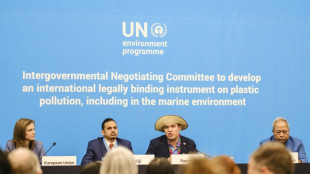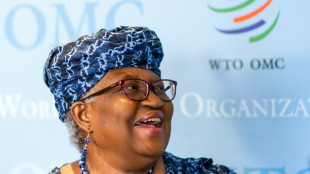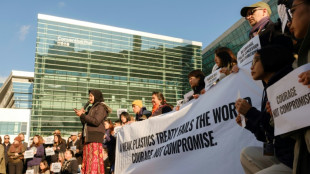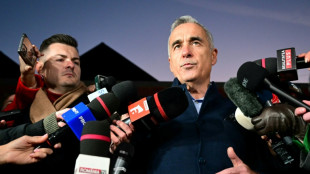
-
 French skipper Dalin leads as Vendee Globe passes Cape of Good Hope
French skipper Dalin leads as Vendee Globe passes Cape of Good Hope
-
Chelsea not in Premier League title race, says Maresca

-
 Brazil's Bolsonaro aims to ride Trump wave back to office: WSJ
Brazil's Bolsonaro aims to ride Trump wave back to office: WSJ
-
France requests transfer of death row convict held in Indonesia: minister

-
 'Mamie Charge': Migrants find safe haven in Frenchwoman's garage
'Mamie Charge': Migrants find safe haven in Frenchwoman's garage
-
Iconic Uruguayan ex-leader hails country's swing left as 'farewell gift'

-
 Thousands rally in Georgia after violent police crackdown on pro-EU protesters
Thousands rally in Georgia after violent police crackdown on pro-EU protesters
-
Shared experiences make Murray 'perfect coach', says Djokovic

-
 Iran, Europeans to keep talking as tensions ratchet up
Iran, Europeans to keep talking as tensions ratchet up
-
Inflation-wary US consumers flock to 'Black Friday' deals

-
 France shows off restored Notre Dame after 'impossible' restoration
France shows off restored Notre Dame after 'impossible' restoration
-
South African bowlers strike after Sri Lanka set big target

-
 Namibia reopens polls after election chaos in ruling party test
Namibia reopens polls after election chaos in ruling party test
-
Georgia police arrest dozens in clashes with pro-EU protesters

-
 US stocks rise on Black Friday
US stocks rise on Black Friday
-
Leclerc on top for Ferrari in Qatar GP practice

-
 Jihadists, allies enter Syria's second city in lightning assault
Jihadists, allies enter Syria's second city in lightning assault
-
Amorim puts faith in Mount to turn around Man Utd career

-
 Guardiola will not 'run' from Man City rebuild
Guardiola will not 'run' from Man City rebuild
-
Assisted dying campaigners, opponents rally at UK parliament

-
 Durable prop Healy set to carve name in Irish rugby history
Durable prop Healy set to carve name in Irish rugby history
-
Macron unveils Notre Dame after 'impossible' restoration

-
 Traumatised Spain marks one month since catastrophic floods
Traumatised Spain marks one month since catastrophic floods
-
Yen rallies, euro up on rising inflation data

-
 Attack-minded Spurs boss Postecoglou says: 'You'll miss me when I'm gone'
Attack-minded Spurs boss Postecoglou says: 'You'll miss me when I'm gone'
-
Syria jihadists, allies shell major city Aleppo in shock offensive

-
 Macron inspects 'sublime' Notre Dame after reconstruction
Macron inspects 'sublime' Notre Dame after reconstruction
-
Arsenal must be near-perfect to catch Liverpool, says Arteta

-
 Arrests, intimidation stoke fear in Pakistan's politics
Arrests, intimidation stoke fear in Pakistan's politics
-
Showdown looms on plastic treaty days before deadline

-
 Ngozi Okonjo-Iweala: the WTO's trailblazing motivator
Ngozi Okonjo-Iweala: the WTO's trailblazing motivator
-
WTO chief reappointed as Trump threat looms

-
 US landmine offer to Ukraine throws treaty into 'crisis': campaign group
US landmine offer to Ukraine throws treaty into 'crisis': campaign group
-
British MPs debate contentious assisted dying law

-
 Macron offers first glimpse of post-fire Notre Dame
Macron offers first glimpse of post-fire Notre Dame
-
Syria jihadists, allies shell Aleppo in shock offensive

-
 Japan government approves $92 bn extra budget
Japan government approves $92 bn extra budget
-
Toll in Syria jihadist-army fighting rises to 242: monitor

-
 UK transport secretary quits in setback for Starmer
UK transport secretary quits in setback for Starmer
-
Days before deadline, plastic treaty draft highlights disagreement

-
 Crypto boss eats banana art he bought for $6.2 million
Crypto boss eats banana art he bought for $6.2 million
-
Teen news boss criticises Australian social media ban

-
 Taiwan detects 41 Chinese military aircraft, ships ahead of Lai US stopover
Taiwan detects 41 Chinese military aircraft, ships ahead of Lai US stopover
-
Spain urged to 'build differently' after deadly floods

-
 WTO chief faces heavy task as Trump threat looms
WTO chief faces heavy task as Trump threat looms
-
Herbert takes control at Australian Open as Smith tanks

-
 Israel PM again warns Iran after top diplomat talks of revising nuclear doctrine
Israel PM again warns Iran after top diplomat talks of revising nuclear doctrine
-
Brilliant Brook's 132 puts England on top against sloppy New Zealand

-
 Brilliant Brook's 132 puts England on top against New Zealand
Brilliant Brook's 132 puts England on top against New Zealand
-
US landmine offer to Ukraine throws global treaty into 'crisis': campaign group


Was Neruda poisoned? Probe members say inconclusive
Two members of a scientific panel that investigated the mysterious death of Nobel laureate Pablo Neruda told AFP that they could not determine whether or not the Chilean poet and diplomat had been poisoned.
The panel of scientific experts delivered a report into Neruda's death to Chilean judge Paola Plaza on Wednesday, with the country on tenterhooks waiting to find out its conclusions.
Researchers Hendrik and Debi Poinar, from McMaster University in Canada, told AFP that their examination of one of Neruda's molars confirmed the presence of dangerous botulism-causing bacteria, but was ultimately inconclusive as to how it entered his system.
"It's there, at the time of his death," they said of the clostridium botulinum DNA, "but we don't yet know why."
"We just know that it should not be there."
Neruda was a celebrated poet, politician, diplomat and bohemian figure, and also a prominent member of the Chilean communist party when former military dictator Augusto Pinochet took power in a 1973 coup.
He had been preparing to flee into exile in Mexico to lead the resistance against the Pinochet regime when he died in hospital just 12 days after the coup.
At that time, the government claimed the 69-year-old had died of prostate cancer.
The panel's findings have yet to be disclosed as Plaza is due to study their report.
In the meantime, rumors have been swirling that the report confirms the suspicion of Neruda's poisoning, which his nephew also claimed earlier this week.
Researchers were only able to reconstruct a third of the bacterium's genome for the study, McMaster University reported on Wednesday.
The Poinars told AFP that they would be able to recreate the rest of the genome without exhuming Neruda's body to gather another sample.
"There are enough materials to do that now with what remains in the lab," they said.
"We just need to know that the court is ok with that."
An investigation into the cause of Neruda's death first began in 2011 when Manuel Araya, who had been his driver and personal assistant, asserted that the poet was given a mysterious injection in his chest just before he died.
In 2017 a group of Chilean and international experts concluded that Neruda did not die of cancer but said they could not determine what did kill him.
Pinochet, who ruled Chile for 17 years, oversaw a regime that killed some 3,200 leftist activists and other suspected opponents.
The dictator died in 2006 at age 91 without ever being convicted for crimes committed by his regime.
Neruda is remembered especially for sensual poems about love.
S.Keller--BTB



